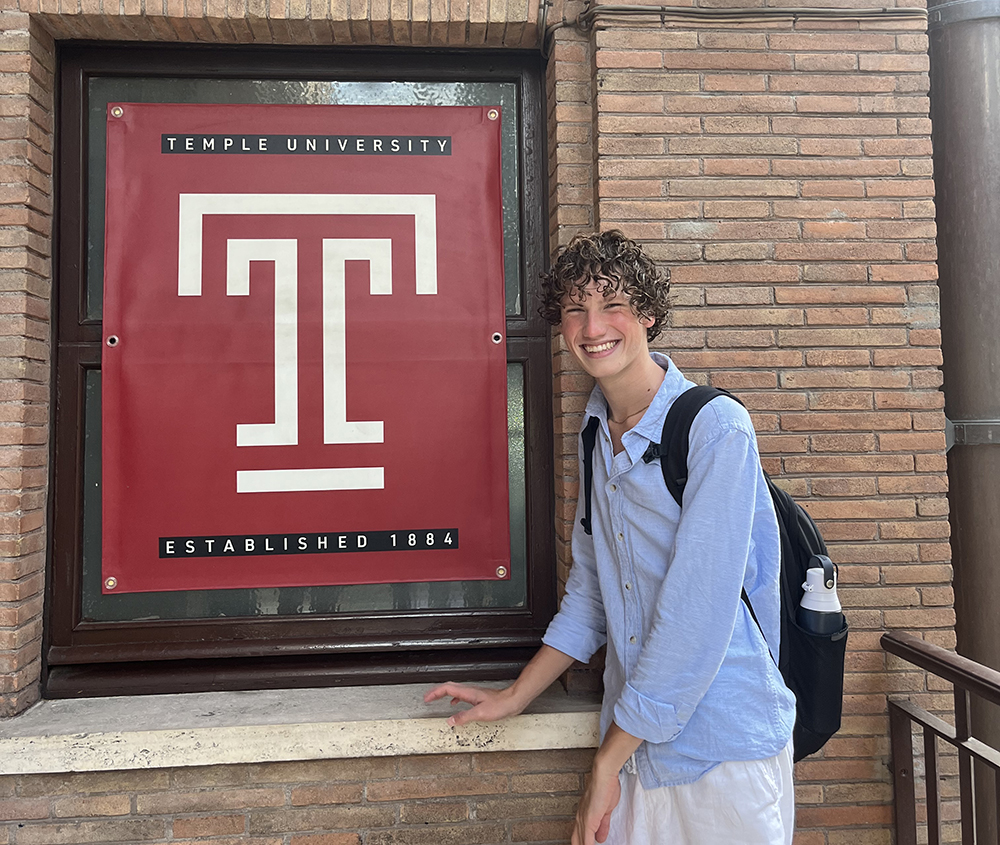With a rigorous academic load, it can be difficult for engineering students to prioritize some of the enriching experiences that Temple and the College of Engineering have to offer, especially studying abroad. However, with preparation and guidance, engineering students can take advantage of all that studying abroad has to offer while staying on track to graduate.
The College of Engineering interviewed Justin Kerney, an industrial and systems engineering student, as he shared his experience at Temple’s Rome Campus and advice on how to stay on track academically while studying abroad.
Every student’s academic and financial aid situation is different. Students interested in studying abroad can reach out to [click-for-email] to schedule an advising appointment and learn more about what the process would look like for them.
College of Engineering (COE): How did you choose where to study abroad?
Justin Kerney (JK): I knew before going into college that I wanted to study abroad and wanted to do it somewhere in Europe! Both sets of my grandparents were immigrants from Europe (Austria and Italy), and so the ability to travel to their birthplace could not be undervalued. Once I found out about the expansive programs that Temple offers surrounding global education, I knew I needed to solidify my spot as an Owl! I choose the Rome campus due to the availability of learning in English, location to a major city, and complete uniformity for Temple resources (i.e not having to work through a sister institution etc.).
COE: What motivated you to study abroad?
JK: I have always been an independent learner, researcher, and student! I knew that studying abroad would teach me what it truly meant to be self-sustained and independent. Above that, the opportunity to immerse myself in a culture different than my own was inspiring and exciting. In terms of academics, Temple University Rome offers certain general education courses that are specific to the Rome Campus, and so I wanted to take advantage of those courses while I was an undergraduate.
COE: How did you work with advising to make this happen?
JK: Out of the shoot, honestly! I began working with advising first semester freshman year to ensure that as a team we could draft a four-year plan that would help me achieve both my personal and academic goals. I began working with an advisor to plan out exactly what the next four years would look like academically before transitioning to work with Melissa Valdes (Assistant Dean of Undergraduate Studies). The plan took lots of effort and workarounds (since some engineering courses are fall only or spring only) before we settled on the perfect semester to actually go abroad!
COE: How were your tuition, fees and financial aid affected?
JK: Temple does an outstanding job with keeping tuition uniform. Even though I was studying abroad in a different country, I was able to effectively leverage my academic scholarship to help reduce academic expenses. Additionally, Temple University abroad programs offer specific scholarships that can be applied for before the start of your program. These resources help students, such as yourself, to make living in another country possible!
COE: What courses did you take while abroad?
JK: While abroad I took 14 credits all composed of general education courses, as these were specifically set aside in my academic plan. I enjoyed IH 1 with Maria Ponce De Leon where she took a unique perspective on classroom environment; most of the course was active dialogue where she facilitated discussion with all the students. Another course I particularly enjoyed was the History of Art in Rome with Professor Frank Dabell. Professor Dabell did an outstanding job of combining traditional learning with an outside exploration initiative where weekly field trips were taken to historic locations in Rome!
COE: How did studying abroad affect your academic plan?
JK: Studying abroad did contribute to a slightly heavier semester on the main campus, but this was largely due to the fact that there are limited engineering courses abroad. The ability to study abroad is not over casted or made impossible by majoring in engineering, but it does require resilience and active planning.
COE: How did studying abroad affect your extracurricular activities?
JK: While abroad my extracurricular activities (Club Tennis Team, Theta Tau Pi Epsilon, Temple Honors Program) were put on hold as time zone differences made meetings challenging. However, Temple University Rome easily fills these gaps by creating focused monthly activities that play off the heart of Italy. In particular, the pizza making class and wine tasting provide a fun time to meet students from your programs and students from across the globe!
COE: What was your favorite part of your experience abroad?
JK: My favorite part about studying abroad was meeting individuals my age from across the globe. I can now confidently say that I have friends EVERYWHERE. From EU countries, to Canada, to the Middle East, I was able to meet students from nearly every background, and it was beyond fulfilling!
COE: How do you feel that studying abroad helped with your engineering journey?
JK: I feel as though study abroad provides engineering students with a more wholistic outlook on professional and personal development. So much of an engineering undergraduate's journey is spent in a lab or behind a computer that they just do not get the same level of exposure to PEOPLE as other majors do. Studying abroad allows your brain to engage in brand new and exciting activities that are sure to alter the way you approach adversity and challenge.
COE: What advice would you give to students interested in studying abroad?
JK: If you are interested in studying abroad, then you are already 10 steps ahead. Studying abroad is all about putting yourself out there, getting connected, and staying engaged. I would encourage you to embrace that interest and use it to complete most of the front-loading work like schedule adjustments and meetings with advising. From there, attend an orientation meeting and just let yourself go!

